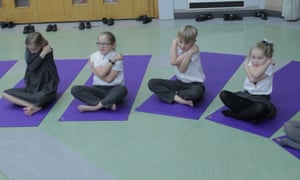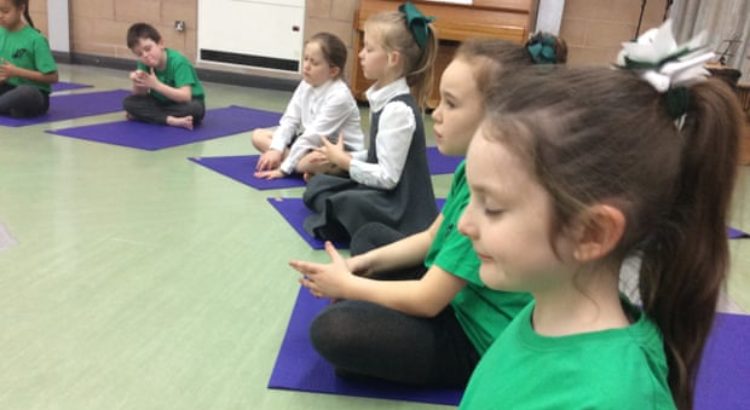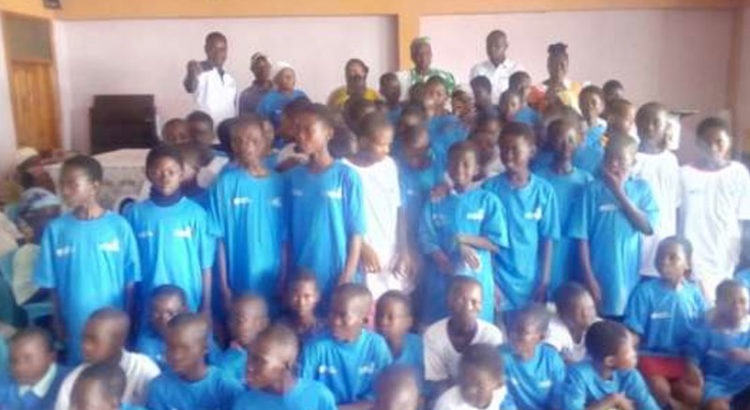By: Rob Walker.
Schools in deprived areas teach meditation to help those affected by violence
English Martyrs Catholic primary school in Litherland is a stone’s throw from one of Merseyside’s most notorious areas for gangs and gun crime, and most children at the school have been affected by the violence.
It is an unlikely place, perhaps, to find a thriving mindfulness teaching programme. But English Martyrs is one of a growing number of schools in deprived parts of Britain that are embracing meditation techniques to help vulnerable children cope.
“We see a lot of pressure put on children’s shoulders due to family circumstances, parents losing their jobs, financial stress, anxiety about crime, fear about homelessness,” said headteacher Lewis Dinsdale.
“Children internalise things, but what mindfulness has done is bring a number of quieter children to the surface – children who we’d never have known were going through such anxiety and stress at home. They haven’t wanted to speak to their mum and dad about it but it’s coming out in these sessions.”
One nine-year-old-boy confided that “petal breathing” – where the children open and close their fingers in time with their breath – helped him to forget about “all the scary stuff”.
“If I concentrate on my breathing, the worrying thoughts just go ‘pop’ and disappear,” he said.
Nationally, the Mindfulness in Schools Project said it had trained nearly 2,000 teachers this year, a jump of 40% on last year, and much of that growth came from schools with higher than average proportions of vulnerable children.
But for cash-strapped schools, it’s not cheap. Dinsdale said that he had to find £2,500 to train one member of staff. “As a head teacher you’re always looking at the bottom line, and that’s a lot of money,” he said.
The investment had paid off, he said, not just helping with children’s mental health but improving their academic performance too. He described how some children used to have panic attacks when sitting Sats. One girl had been physically sick on her test paper. He was critical of Ofsted inspectors for not being more tuned in to the benefits of mindfulness. “It’s frustrating because it isn’t a box that they have to tick,” he said.

Dinsdale has been so convinced by the positive effect that the school has now introduced mindfulness workshops for parents too. “Some mums and dads are at breaking point and they’re taking it out on the children. They don’t know who to turn to,” he said.
Steele said children at his school were probably among the most difficult young people to care for because they were used to pushing people away. Mindfulness, though, had built their self-esteem and was now a hugely positive force in their lives.
“It’s helping them to engage with the present rather than worrying about the future or blaming the past for everything,” he said.
Many of the teenagers have missed years of schooling; most have never sat exams before. He said that before mindfulness became part of the curriculum, they would do everything they could to avoid taking tests.
“They would just run around school slapping people, calling them Muppets, ripping paper, just really low-level behaviour,” he said.
That type of disruptive behaviour has not gone away, but it has tailed off. It happened because they were scared of failure, he said. That had been their life experience. “But showing them how to do meditation is helping them learn about relaxation, it’s given them a confidence they never had.”









 Users Today : 37
Users Today : 37 Total Users : 35459632
Total Users : 35459632 Views Today : 83
Views Today : 83 Total views : 3418055
Total views : 3418055